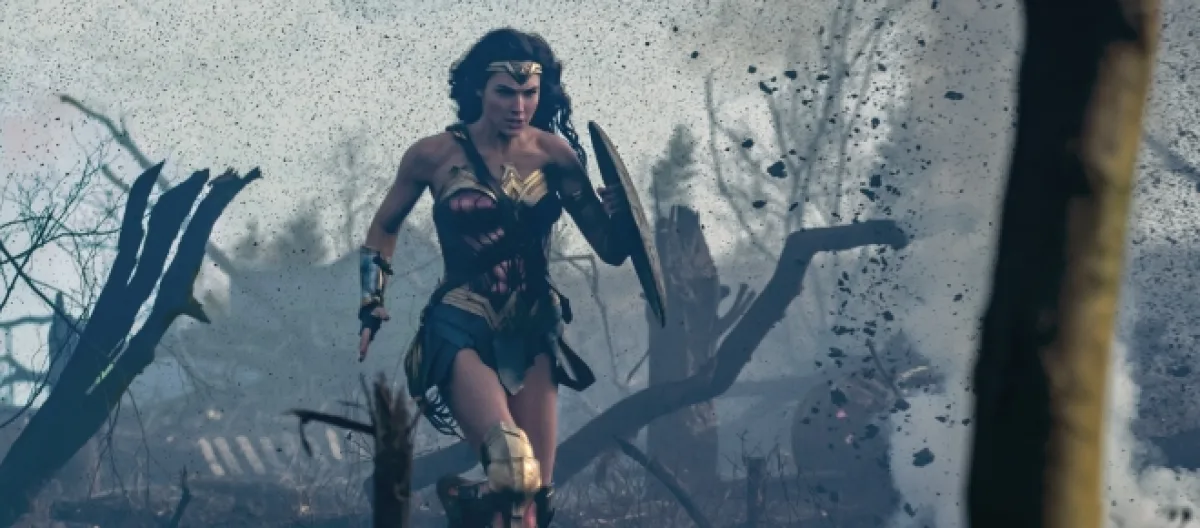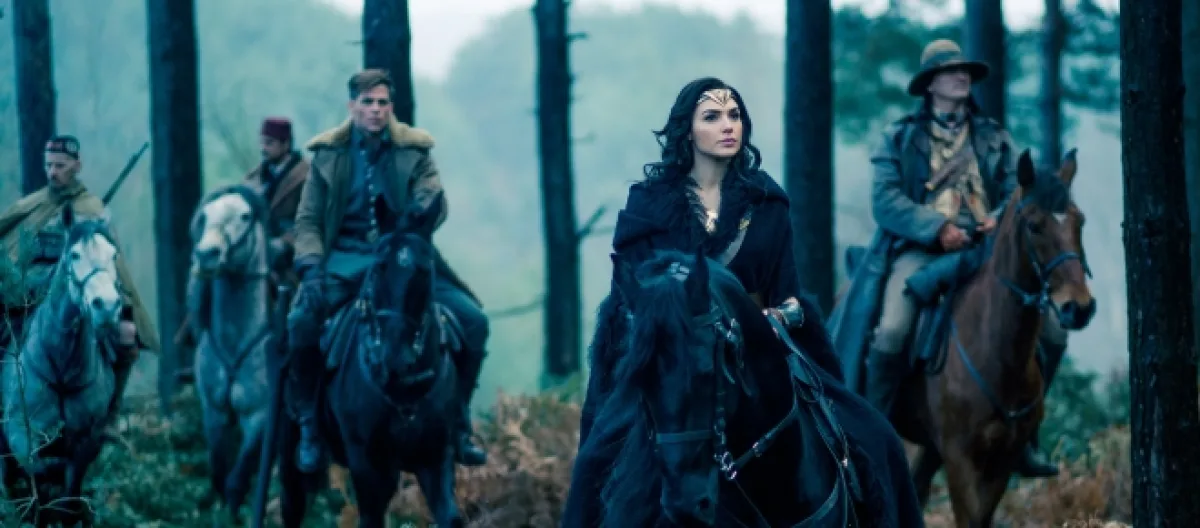Everyone had high hopes for this movie, the first stand-alone Wonder Woman movie in the DC character’s long history. Gal Gadot’s brief appearances in Batman V Superman were some of that film’s highlights.
The trailers promised action and visual delights; the film delivered these fundamental requirements. Then on several unsuspected levels, it surpassed the expectations and smashed through the confines of the comic book hero/heroine genre and delivered far more than was expected: an anti-war epic film capable of moving viewers to tears and then uplifting them.
Expectations were for a feminist icon Hollywood style; of course, WW would be beautiful, intelligent, strong and the rest of it. Gadot was cast from hundreds of hopefuls in the role of Diana Prince, and she brought remarkable strength and beauty to the role. These were exceeded by Gadot’s vulnerability and innocence – to an extent which wasn’t expected.
About the film
Born and raised on the Amazon stronghold, Diana was highly educated, but unaware of the ways of the world. She encounters WWI pilot Steve Trevor (Chris Pine), swiftly followed by his German pursuers who slay sword- and bow-wielding Amazons with their superior weaponry - our first anti-war comment, with more than a few echoes of historic colonial decimation of native cultures still going on today.
The battle on the Amazonian beach was not our first invitation to consider combat issues. The question of whether to train for battle came earlier, when girlhood Diana longed to learn the arts of warfare but her mother objected, wanting to keep her safe. Can parents keep their children safe? The answer ‘no’ was given swiftly when the German troops arrived. We need to know how to defend ourselves and what we hold dear. Soon the film took us to the offensive side of military preparedness.
Diana listens to Steve tell her of the great war raging across the globe and of the millions who have died. Her mother Hippolyta who was a great warrior wants her to stay; Diana knows she must go and do something about this war.
She leaves her island paradise for good: once you see the realities of evil, there is no return to innocent peaceful beauty. Bidding her mother and her former life goodbye forever, Diana accompanies Steve Trevor to London, and from there to the front.
A few jokes
There are some laughs in London; Diana needs clothes to blend in, and wonders how women can fight in such restrictive, impractical clothing. There is a joke or two about the role of the secretary, about women not being allowed to attend high-level meetings or vote, and these make points about feminism and how much further we have to go. Diana is new to this world. If she found London with its choking fog and dark towers ‘hideous’, wait until she gets her wish and gets to the front lines.
Diana and Steve team up with a trio of men to make their way to the front lines. The parallel is with the Scot and Welshman in Henry V who are flawed rogues, but who will fight for their cause. One of these is a man who wants to be an actor – his skin is too dark. One is a native American turned smuggler – everything has been taken from him, and now he smuggles. Later we see him helping those who have like him lost everything to warfare when he meets them on front lines – this is a hero.
Real horror
Diana travels with this team out of London, she sees the wounded and the shell-shocked pass her as they return home. They reach the front. Horses are suffering under heavy loads, there is more injury, and then real horror as they reach the front trenches.
A woman pleads that her village has been overtaken, and the villagers enslaved. Diana’s face reflects shock and empathy throughout all the previous scenes. The innocent Diana, raised in a paradise, is horrified by this war’s brutality and sees that the war horses and innocent people are its victims. Her face, her reactions to the horror around her are genius – the writing is superb, the imagery as awful as it intends to be, and GAdot’s revulsion at the horror of war are outstanding.
She cannot stand any more without taking action. Despite calls from the others to stay in the trenches, she literally puts her head above the parapets and charges the opposing forces. The village is liberated, the people celebrate.
All seems well.
Victory and happiness are short lived
Without giving too much away of this deftly-crafted plot, victory and happiness are short lived. A masterfully-cast David Thewlis takes a turn as Mars, God Of War, whom Diana knew must be somewhere around this hellish war.
Diana set out to literally destroy war. She assumed the most violent, cruel leader of the Germans must be Mars the god of War. That would have been too easy, and War is the quiet English politician played by David Thewlis. Thewlis delivers a cold, chilling speech on human nature and war and this scene alone is worth several accolades. All the god of war has done is to enable the human race to choose war, and they have chosen war in spades, killing each other indiscriminately from great distances.
Diana has already questioned a Scots sharp-shooter in her small party about killing someone when you cannot see their eyes – she calls this murder. It is.
Not a paper doll
GAdot is not posing her way through this film; she’s not a cardboard cut-out paper doll chosen only for her resemblance to the Wonder Woman comic. When she battles, when she is furious, you sense she could not care less what she looks like – and this lack of enslavement to looking beautiful not only makes the film work that bit more, it’s another lesson in feminism.
Provoked beyond all endurance by this war, by the costs paid in innocent blood, and forced to realise that all people have both good and evil in them, Diana could have been forgiven for joining Mars and hating people for all they have done and the violence and pain she has seen them dish out.
She faces her moment of truth, has a revelation on the superior power of love, and as super-heroines do, she does the right thing. She emerges as Wonder Woman.
The many observations on the failings and beauty of human behaviour mark this as a film that deserves a place in the anti-war pantheon of great movies. How the idea of making this original film such a powerful vehicle for promoting peace came about should be known. It accomplishes this anti-war message while retaining the values and codes of a comic super-hero film – some comic relief, fantastic action scenes, dazzling sets, and a wonderfully-constructed mythology. The writing (screenplay by Allan Heinberg, story by Zack Snyder & Allan Heinberg and Jason Fuchs) is perfect: where no words are required, none are written.
Managing this massive project is Director Patty Jenkins (“Monster,” AMC’s “The Killing”), and there not one single scene that could be better realised.
Feminist ideology to emulate
Wonder Woman is the DC world at its best since the halcyon days of the late great Christopher Reeve. Wonder Woman is a modern feminist ideology to emulate. Wonder Woman is a great anti-war film holding up a mirror to the ugliness and reality of the senseless suffering of war. More movies like this please. If the team behind this diamond can be harnessed for more projects in and out of the comic genre, please let that happen.
It is a tragic irony that mindless violence in Manchester caused the London premier of this anti-war, pro-woman film to be cancelled. But one premier less cannot dampen these messages – and a finer collection of messages in a movie is a rare thing.

